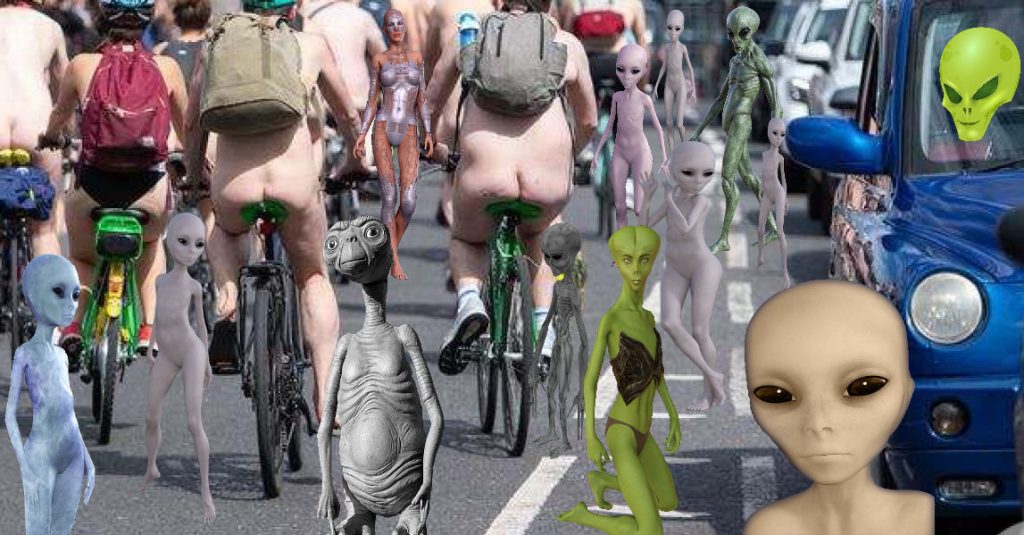
An Alien is one who so fails to advance technologically that they become an alien in their own home land.
James Lyman BSAE, BSEE, MSSM
In the news recently was a short story about thousands of people riding bicycles naked through the streets of London to protest the growing car culture and excessive use of oil. The question came to my mind ‘just how is riding bicycles in the nude suppose to address the effects of automobiles and oil usage on the environment and humanity’? The answer is quite obvious- it WON’T!! So why do it? Why choose a method for solving problems that has virtually no expectations of accomplishing anything? What is going through their minds?
This is just one example of people struggling to cope with the world they live in, a world where they are becoming more and more an outsider. It’s a world that confuses, perplexes them, that they are fearful of, distrustful and resentful of. It’s like they become aliens in their own homeland. As you closely examine these kind of people you find one commonality . . . they don’t have a strong inclination towards technology. Indeed, many are careful to avoid technology as much as they can, even to the point of becoming openly hostile towards technologies except those which make their lives easier. And even then, they want to know as little as possible about those technologies.
People who fail to advance technologically become an alien in their own homeland.
This alienation presents a number of problems for those trying to live in a world they’re not a part of, that manifest itself in some strange and even outlandish ways . . . like riding around naked in public expecting that to actually solve problems (feeding mosquitos?). But there are many more subdued manifestations. We naturally fear that which we don’t understand, and being an alien means living among a mirid of things they don’t understand, both tangible and intangible. It leaves them with a low level, continuous, slow grinding always present fear. This makes them uncomfortable, ill at ease in the modern world, accentuating that they don’t belong, and that in turn brings a longing for a place where they do belong. And unable to find such a place of their own, a place where they don’t feel that slow grinding fear and apprehension, a place where they can feel comfortable and at ease . . . they experience those various manifestations.
Aliens strive to isolate themselves from those technologies they don’t want in their lives … in their world. They are careful not to acknowledge what they consider unwanted technologies, ignoring their existence, even physically masking them off from view if possible. Most of all they don’t want to hear any technical talk, or for that matter, any talk at all about technology. Indeed, they can become quite aggravated even angry at those of technology, if unable to avoid them. Aliens begin to embrace less than rational beliefs, reverting back to beliefs centuries ago, to belief systems and religions long before the age of enlightenment.
The emotional frustration and tensions causes aliens to blindly lash out at things, people and situations around them. This is particularly true of those individuals, who aliens perceived as not sharing their view of life. This has manifested itself in what is called the counterculture, which started emerging in the early 1960’s, cumulating in the so call ‘hippy culture’, that quickly dispersed to become less visible. Nevertheless, the counterculture has continued and grown, not nearly as visible as it once was, but still having a profound effect on American culture and politics. More and more aliens want and strive for their own world where they have a place of comfort. This has resulted in the growing social mitosis we see everyday in the political news, as political division deepens with sides becoming less reconcilable.
There is a profound economic side to this alienation, and that’s the inability of people to make substantive contributions to society. The desire to make contributions to society is one of the major threads that makes up the fabric of a society. Not only do people earnestly want to make contributions, to be known as a useful member of society, but the opposite is also true. Society has little tolerance for those perceived as not being contributors. People who have not advanced technologically, those who are alienated, have less ability to make substantive contributions, and therefore find themselves even more alienated from the world they were born into and try to live in. Their value to society is as consumers working to support consumers, trying to scrape together monies to buy the illusion that they have value in a high technology society, which they don’t like in the first place.
Trying to isolate themselves from technology only aggravates their situation, thereby making themselves even more alienated . . . making themselves even more discontented with their station in life. This in turn only makes them blindly strike out against the world they are forced by circumstances to live in, while at the same time making it more difficult to be a real contributor. Furthermore, as parents naturally do, they strive to mold their children into their own image, and in so doing their kids also become alienated.
It’s a self perpetuating cycle.
This phenomena of alienation is the most misunderstood and understudied facet of our modern society, which only results in a growing problem that is not being addressed. Problems, that have major ramifications to society, and which if unaddressed do not get better, will only worsen over time.
As I finish writing this, I’m watching the movie “Wild” based on Cheryl Strayed’s book1 by the same name, which chronicles the struggles of an alien … her trials and tribulations as she makes her way through early life. Watching it, you can’t help but have empathy with aliens and their plight in life.
1) “Wild – From Lost to Found on the Pacific Crest Trail”, Cheryl Strayed, Vintage Books, New York, 2012
